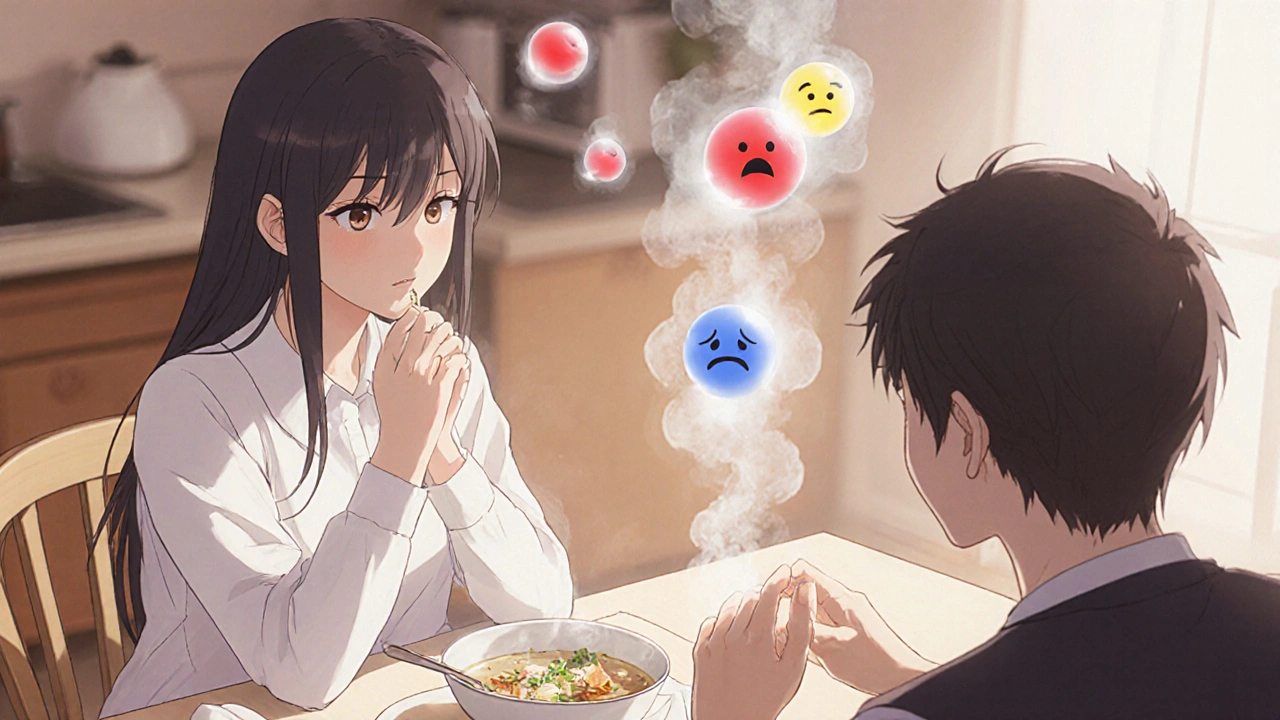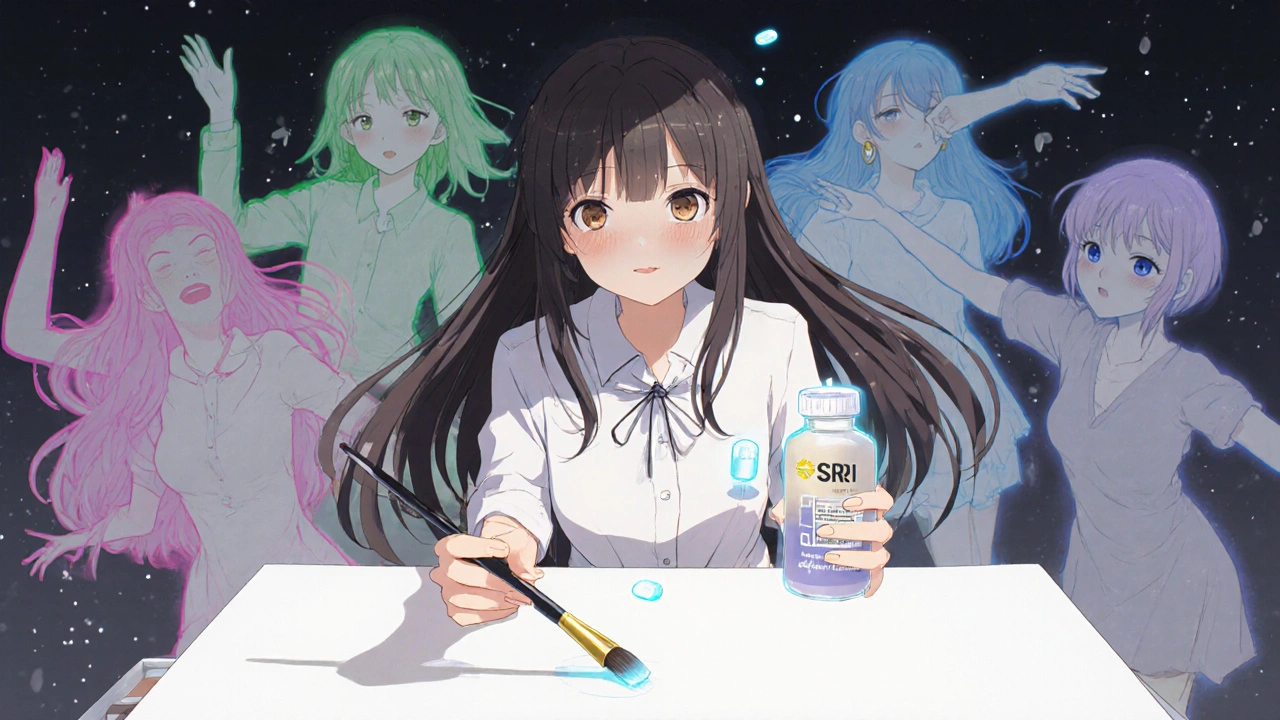Antidepressant Emotional Blunting Comparison Tool
Emotional Blunting Risk Comparison
This tool shows the percentage of users reporting emotional blunting with different antidepressants, based on clinical studies mentioned in the article.
Remember: Emotional blunting affects 40-60% of SSRI users but is less common with other antidepressants. Always consult your doctor before making any changes to your medication.
| Antidepressant | Emotional Blunting Risk | Key Characteristics |
|---|---|---|
| SSRIs (Sertraline, Escitalopram, Fluoxetine) | 50% (40-60%) |
Most commonly prescribed, but high emotional blunting risk Risk increases with higher doses (e.g., 20mg escitalopram vs. 5mg) |
| Bupropion (Wellbutrin) | 33% (~33%) |
Targets dopamine and norepinephrine, not serotonin Recommended as first alternative for emotional blunting |
| Mirtazapine & Agomelatine | ~30-40% (Varies) |
Work on different serotonin receptors Data is less comprehensive, but may preserve emotional sensitivity better |
| Vortioxetine | ~40% (Varies) |
Sometimes called 'better' SSRI, but studies limited Most research comes from manufacturer, less independent data |
What to do if you're experiencing emotional blunting
- Check your dose - Many people are on more than they need. Reducing by 25-50% may help 68% of cases.
- Consider switching - Switching to bupropion improved emotional blunting in 72% of cases according to clinical studies.
- Track your symptoms - Keep a journal of your emotional experiences to share with your doctor.
- Ask about alternatives - Only 38% of psychiatrists routinely screen for emotional blunting.
Always work with your doctor to safely adjust medication - never stop suddenly.
Many people start SSRIs to escape the crushing weight of depression. They expect to feel better-lighter, clearer, alive again. But for a lot of them, something unexpected happens: they don’t feel much at all. Not sadness. Not joy. Not even the warmth of a hug or the sting of a sad movie. It’s not laziness. It’s not being weak. It’s emotional blunting-a side effect so common, yet so rarely talked about, that many patients think they’re going crazy.
What Emotional Blunting Actually Feels Like
Emotional blunting isn’t just being ‘a little dull.’ It’s losing the texture of your inner world. People describe it as living behind glass. You smile because you know you should, but your chest doesn’t fill up with warmth. You hear your child laugh, and instead of joy, there’s just… quiet. You used to cry at weddings. Now you just stare. You used to get angry when someone cut you off. Now you shrug. The highs are gone. The lows? They’re muted too. Grief doesn’t hit like a wave anymore-it’s a slow leak.
This isn’t imagination. Studies from the University of Cambridge and the University of Copenhagen show that 40 to 60% of people taking SSRIs like sertraline, escitalopram, or fluoxetine report this kind of emotional flattening. It’s not rare. It’s routine. And it’s not just about feeling less happy-it’s about losing the full range of human emotion. Anger, grief, love, excitement-all of it gets turned down, like a volume knob stuck halfway.
Why This Happens: It’s Not Just ‘Too Much Serotonin’
For years, doctors said SSRIs worked by boosting serotonin. That’s still true. But now we know more. The real issue isn’t just serotonin levels-it’s how the brain learns from experience. A landmark 2022 study found that SSRIs interfere with reinforcement learning, the brain’s way of connecting actions to outcomes. If you do something and feel good, your brain remembers: ‘Do that again.’ If you feel bad, you avoid it. SSRIs dull that feedback loop. You stop learning from pleasure. You stop learning from pain. And without that, emotions lose their meaning.
This is why emotional blunting affects ‘hot cognition’-things tied to feeling-more than ‘cold cognition’ like memory or logic. You can still solve math problems. You just don’t care if you get them right. You can still hold a conversation. But you don’t feel the connection.
Who’s Most at Risk?
It’s not random. Higher doses of SSRIs mean higher risk. People on 20mg of escitalopram are more likely to feel numb than those on 5mg. It’s also more common in people who started SSRIs for moderate depression-not severe. Those with extreme despair often welcome the numbness at first. ‘At least I can get out of bed,’ they say. But months later, they realize they’ve lost the person they used to be.
Women report emotional blunting more often than men, possibly because they’re more likely to seek help and be prescribed SSRIs in the first place. People in creative fields-artists, writers, musicians-are especially vulnerable. Their work relies on emotional depth. When that dries up, so does their inspiration.
And it’s not just the person taking the drug. Relationships suffer. Partners report feeling like they’re talking to a ghost. One woman on an antidepressant forum wrote: ‘My husband stopped saying ‘I love you.’ Not because he didn’t mean it. Because he couldn’t feel it enough to say it.’

SSRIs Aren’t the Only Culprits-But They’re the Most Common
SNRIs like venlafaxine can cause the same thing. But not all antidepressants do. Bupropion (Wellbutrin) is the standout exception. Studies show only about 33% of users report emotional blunting-nearly half the rate of SSRIs. That’s why many psychiatrists now recommend bupropion as a first switch option. It works differently: it targets dopamine and norepinephrine, not serotonin. That means it can lift mood without turning down the emotional volume.
Mirtazapine and agomelatine also show promise. They work on different serotonin receptors and may preserve emotional sensitivity better. But the data is thinner. Vortioxetine is sometimes mentioned as a ‘better’ SSRI, but most of the studies come from the drug’s manufacturer, so it’s hard to trust fully.
Switching from one SSRI to another? That rarely helps. If escitalopram made you numb, sertraline probably will too. The problem isn’t the specific drug-it’s the class.
What to Do When You Feel Numb
If you’re on an SSRI and you’ve noticed your emotions fading, don’t panic. But don’t ignore it either. Here’s what actually works, based on clinical evidence:
- Check your dose. Many people are on more than they need. Reducing your dose by 25-50% helped 68% of patients in one study. Talk to your doctor about tapering down slowly-never stop cold.
- Switch to bupropion. A 2022 meta-analysis found that switching from an SSRI to bupropion improved emotional blunting in 72% of cases. You can even add a low dose of bupropion (150mg/day) to your current SSRI to help reduce the SSRI dose while keeping depression under control.
- Don’t rush. It takes 4-6 weeks for emotional sensitivity to return after a change. Be patient. And track your feelings. Keep a simple journal: ‘Today, did I feel joy? Sadness? Anger? Did I cry? Did I laugh?’
- Ask for screening. Only 38% of psychiatrists routinely ask about emotional blunting. If yours doesn’t, bring it up. Say: ‘I’m not feeling much anymore. Is this a known side effect? Can we check if this is the drug or if my depression is still hanging on?’
Some people worry that reducing or stopping their SSRI will bring back the depression. That’s valid. But emotional blunting isn’t just a side effect-it’s a signal. It’s your brain saying, ‘This isn’t working the way it should.’

The Hard Truth: Sometimes the Numbness Was the Only Way Out
Let’s be honest. For some, emotional blunting felt like a gift at first. One man on a support forum wrote: ‘I was suicidal. I couldn’t cry. I couldn’t feel anything. But I didn’t want to die anymore. That numbness saved me.’
That’s real. And it’s not wrong. If SSRIs kept you alive when nothing else could, that matters. But survival isn’t the same as living. The goal isn’t just to stop crying-it’s to feel joy again. To hold your child without feeling like a robot. To laugh at a joke without wondering if you’re supposed to.
There’s no shame in wanting to feel more. And there’s no failure in asking for help to get there.
What’s Changing in 2025
The medical world is finally catching up. In 2022, the European Medicines Agency added emotional blunting to SSRI product labels. The National Institute of Mental Health is spending $4.2 million to find biological markers for it. And 12 of the 17 new antidepressants in late-stage trials are designed specifically to avoid this side effect.
One company, Mindstrong Health, is testing a digital tool that uses your phone’s typing speed and app usage to detect emotional flattening before you even notice it. It’s still in beta, but it’s a sign: this isn’t going away. It’s being taken seriously.
Some experts, like Dr. David Healy, argue we need entirely new approaches-ones that don’t rely on serotonin at all. Maybe that’s the future. But for now, we have what we have: SSRIs that work, but cost us our feelings.
Final Thoughts: You’re Not Broken
If you’re reading this and you feel empty, you’re not alone. You’re not weak. You’re not failing at recovery. You’re experiencing a known, common, and medically recognized effect of a widely prescribed drug.
And you have options. You don’t have to stay numb. You don’t have to choose between depression and detachment. There’s a middle ground. It might take time. It might mean changing your medication. It might mean talking to a new doctor. But you deserve to feel your life-not just survive it.
Is emotional blunting the same as depression?
No. Depression usually involves intense sadness, guilt, or hopelessness. Emotional blunting is the opposite-it’s a lack of feeling altogether. You might still be depressed, but the numbness you feel from SSRIs is a separate effect. Sometimes, the two overlap, which is why doctors need to ask the right questions.
Can emotional blunting go away on its own?
Sometimes, yes-but not often. A small number of people adapt over time and regain some emotional range after months or years. But for most, the numbness stays unless the medication is changed or the dose is lowered. Waiting it out isn’t a reliable strategy.
Does everyone on SSRIs get emotional blunting?
No. About 40-60% of users report it, but some feel no change at all. It depends on your brain chemistry, your dose, your reason for taking the drug, and even your personality. Some people are more sensitive to serotonin changes than others.
Is bupropion a good alternative to SSRIs?
For many people, yes. Bupropion doesn’t affect serotonin the same way SSRIs do, so it’s far less likely to cause emotional blunting. It’s also effective for depression, especially when low energy or lack of motivation are main symptoms. It’s not perfect-it can cause anxiety or insomnia in some-but it’s often the best next step if SSRIs are dulling your emotions.
Can I just stop my SSRI if I feel numb?
No. Stopping SSRIs suddenly can cause withdrawal symptoms like dizziness, brain zaps, nausea, or even a return of severe depression. Always work with your doctor to taper off slowly. Even if you feel numb, your brain still needs time to adjust.
Why don’t doctors talk about this more?
Because until recently, it wasn’t well documented in medical training. Many doctors still think emotional blunting is just ‘residual depression’ or a sign the patient isn’t trying hard enough in therapy. But research since 2020 has shown it’s a direct drug effect. Patient advocacy and new studies are changing that-but it’s still under-screened. If you bring it up, you’re helping push the system forward.


Bart Capoen
October 28, 2025 AT 14:49Been on sertraline for 3 years. Started feeling like a zombie at year two. Didn’t know it had a name until I found this post. Took me 6 months to taper down to 25mg and switch to bupropion. Now I cry at dog videos again. Weird how something so common feels so isolating.
luna dream
October 29, 2025 AT 16:13They’re not telling you the whole story. SSRIs were pushed by Big Pharma to keep people docile. Numbness? That’s not a side effect-that’s the feature. Look at how many people on these drugs just… accept it. Like it’s normal to feel nothing. Who benefits? The ones selling the pills.
Linda Patterson
October 31, 2025 AT 14:51Wow. So now we’re blaming the medicine instead of taking personal responsibility? You’re telling me you can’t just… try harder? My grandma lived through the Depression and never took a pill. She felt everything-even grief. You people are weak. This isn’t science-it’s surrender wrapped in a lab coat.
Jen Taylor
November 2, 2025 AT 09:51Thank you for writing this. I’ve been terrified to say this out loud-like I’m broken for not feeling joy. I’m on 10mg of escitalopram now, down from 20. Last week, I laughed at a squirrel trying to steal my sandwich. I cried. Not because I was sad-because I felt it. It’s tiny. But it’s real. You’re not alone. And you’re not failing. You’re healing.
Shilah Lala
November 3, 2025 AT 13:42So… let me get this straight. You took a pill to feel better, then complained when it worked too well? Like, you wanted to be happy, but not too happy? What’s next? A coffee that gives you just the right amount of caffeine? Maybe we should just… let people be sad. Like, naturally. Without drugs. Or opinions.
Christy Tomerlin
November 3, 2025 AT 18:07Bupropion? That’s the one that makes you jittery and gives you headaches, right? I tried it. Didn’t work for me. SSRIs are fine. If you can’t handle a little emotional flatlining, maybe you’re not cut out for modern life. We’re all numb. You’re just the first to notice.
Susan Karabin
November 4, 2025 AT 13:30Emotional blunting isn’t the enemy. The enemy is the belief that we should always feel something. We’re taught to chase highs and avoid lows. But what if numbness is just your soul taking a breath? Maybe it’s not about getting your feelings back. Maybe it’s about learning to sit with the quiet. The quiet isn’t empty. It’s waiting.
Lorena Cabal Lopez
November 4, 2025 AT 20:35People are so dramatic these days. You take a pill. You feel less. Big deal. Everyone’s on something. I’ve seen moms on Adderall, teens on Zoloft, grandpas on gabapentin. You want to feel? Go hike. Meditate. Read poetry. Stop blaming a pill for your lack of motivation. It’s not the drug. It’s you.
Stuart Palley
November 6, 2025 AT 18:31My therapist said I was ‘resistant to change’ when I told her I felt like a ghost. She didn’t even know what emotional blunting was. I had to Google it. Then print out this exact article and hand it to her. She apologized. That’s the problem. Doctors don’t know. And they don’t care until you shove it in their face.
Glenda Walsh
November 6, 2025 AT 23:51Hi! I’m so glad you shared this. I’ve been there. I took a 50mg dose of fluoxetine for 18 months and stopped feeling my husband’s touch. I didn’t know if I loved him anymore. I cried every night. Then I found a functional medicine doctor who did a serotonin panel and switched me to mirtazapine. I’m back. I hug my kids now. I feel the sun. You can too. Let me know if you want my doctor’s info. I’ll send it. You’re not alone. I’m here. Always.
Tanuja Santhanakrishnan
November 7, 2025 AT 03:58This is so true. I’m from India, and here, depression is still whispered about. But emotional numbness? No one talks about it at all. My sister was on sertraline for two years. She stopped painting. Stopped singing. She said she could hear her own heartbeat but couldn’t feel it. Switched to bupropion. Three months later, she painted a mural of a crying sun. It was the most beautiful thing I’ve ever seen. You’re not broken. You’re just waiting to bloom again.
Natalie Eippert
November 8, 2025 AT 11:41Interesting. But I must point out that the American medical system is over-reliant on pharmaceuticals. In Europe, therapy is the first-line treatment. Here? You get a script before you even finish the intake form. This isn’t about SSRIs. It’s about a culture that outsources emotional labor to pills. We need systemic change. Not just drug switches.
kendall miles
November 10, 2025 AT 02:55They’re watching you. The algorithm knows you read this. They’re testing emotional suppression tech through SSRIs. You think this is coincidence? The same companies that make antidepressants also make surveillance software. Your numbness? It’s data. They want you quiet. Still. Compliant. Wake up.